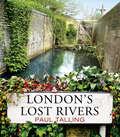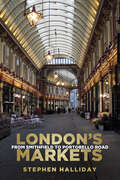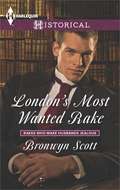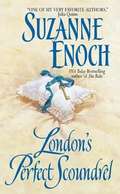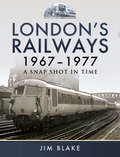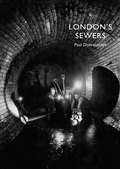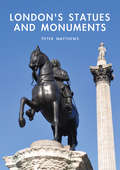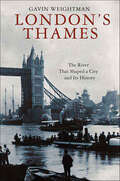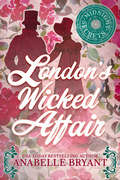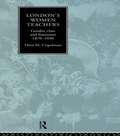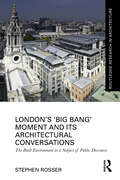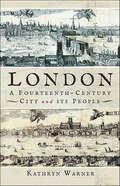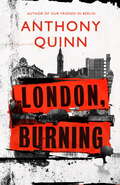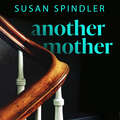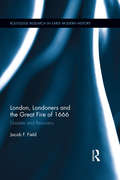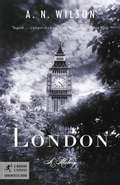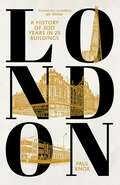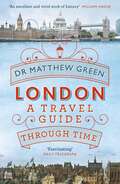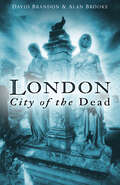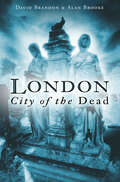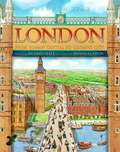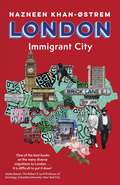- Table View
- List View
London's Lost Rivers: a beautifully illustrated guide to London's secret rivers
by Paul TallingPacked with surprising and fascinating information, London's Lost Rivers uncovers a very different side to London - showing how waterways shaped our principal city and exploring the legacy they leave today. With individual maps to show the course of each river and over 100 colour photographs, it's essential browsing for any Londoner and the perfect gift for anyone who loves exploring the past...'An amazing book' -- BBC Radio London'Talling's highly visual, fact-packed, waffle-free account is the freshest take we've yet seen. A must-buy for anyone who enjoys the "hidden" side of London -- Londonist'A fascinating and stylish guide to exploring the capital's forgotten brooks, waterways, canals and ditches ... it's a terrific book' - Walk'Pocket-sized, beautifully designed, illustrated and informative - in short a joy to read, handle and use' -- ***** Reader review'Delightful, informative and beautifully produced' -- ***** Reader review'A small gem. A really great book. I can't put it down' -- ***** Reader review'Fascinating from start to finish' -- ***** Reader review************************************************************************************************From the sources of the Fleet in Hampstead's ponds to the mouth of the Effra in Vauxhall, via the meander of the Westbourne through 'Knight's Bridge' and the Tyburn's curve along Marylebone Lane, London's Lost Rivers unearths the hidden waterways that flow beneath the streets of the capital. Paul Talling investigates how these rivers shaped the city - forming borough boundaries and transport networks, fashionable spas and stagnant slums - and how they all eventually gave way to railways, roads and sewers. Armed with his camera, he traces their routes and reveals their often overlooked remains: riverside pubs on the Old Kent Road, healing wells in King's Cross, 'stink pipes' in Hammersmith and gurgling gutters on streets across the city. Packed with maps and over 100 colour photographs, London's Lost Rivers uncovers the watery history of the city's most famous sights, bringing to life the very different London that lies beneath our feet.
London's Markets: From Smithfield to Portobello Road
by Stephen HallidayLondon is a City of Markets: markets in meat, fish, fruit, vegetables, money, insurance, shipping and, occasionally, in stolen goods. Stephen Halliday’s book is a comprehensive account of the often lurid and controversial history of its markets from Roman Londinium to the London of Boris Johnson as well as a guide to visiting them (and emerging with a bargain).
London's Most Wanted Rake
by Bronwyn Scott"Channing Deveril-a new woman every night. You're worried about scandals? You are a scandal!" Rumor has it that Channing Deveril, founder of The League of Discreet Gentlemen, is tired of warming women's beds. But when he encounters the alluring Alina Marliss, the stage is set for his most ambitious assignment yet.... Alina is accustomed to teetering on the edge of scandal, so Channing's skillful seduction is a complication she definitely doesn't need! She might crave his expert touch, but she has no intention of losing her head-much less her heart-over London's most notorious rake! Rakes Who Make Husbands Jealous Only London's best lovers need apply!
London's Perfect Scoundrel (Lessons in Love #2)
by Suzanne EnochA determined young lady vows to give one of London's infamous rakes his comeuppance -- but when the rogue turns the tables, who truly learns a lesson in love? Beloved Sinner The ton gossips call him "Saint" -- but the Marquis of St. Aubyn has well earned his reputation as London's perfect scoundrel. Evelyn Ruddick knows she should avoid him at all costs -- but the strikingly beautiful lady wants to aid the children of the Heart of Hope Orphanage, and he heads the board of trustees. Evie is determined to teach the charming, arrogant man a lesson in compassion, but it won't be so easy -- especially since his touch is setting her desire aflame, making Evie yearn to submit to his passionate instruction ... The idea of joining in her "project" is unthinkable, but this enchantress refuses to give up! So what else is there for a self-respecting rake to do but seduce the lady? Yet soon it is he who is being seduced by Evie's tender heart and fiery blushes. Could the temptation of long, passionate nights in her arms bring about the impossible? Could the disreputable Saint at long last be reformed?
London's Railways, 1967–1977: A Snap Shot in Time
by Jim BlakeThis pictorial book covers London's railways from 1967 to 1977, showing the transition from steam to diesel and electric traction.This volume has a very readable narrative, telling tales of the authors adventures during his many trips around the London railway network.The volume encapsulates a period of time in Britain, during which a great deal of change was taking place, not only with railways and transport, but also socially and economically.Jim Blake, describes all of these changes, while also looking at the capitals transport scene of the period.
London's Sewers
by Paul DobraszczykVictorian London was filthy. The city was growing at an exponential rate, and the existing systems of waste disposal could not cope, resulting in a sanitary crisis. The solution was a new drainage system for the entire city, which was constructed mainly in the 1860s. Paul Dobraszczyk charts the development and construction of this immense project, using both contemporary and modern imagery to illustrate the complex engineering and magnificent architecture built deep underground to service the modern city of London.
London's Statues and Monuments
by Peter MatthewsThe streets and public spaces of London are rich with statues and monuments commemorating the great people of history. From the monumental Nelson's Column in Trafalgar Square and Sir Christopher Wren's Great Fire Monument to the charming Peter Pan statue in Kensington Gardens, and the bronze of Paddington Bear on the lawn of the railway station that gave him his name, the range of London's statues and monuments is huge. Some commemorate events, while others celebrate people, real and fictional. Some take the form of small reliefs, while others are huge pedimented bronzes, larger than life size. Executed in stone, bronze and a range of other materials, London's statues and monuments include work by some of the greatest sculptors.Shire first published a book on this subject in 1968, and for forty years it was a stalwart of the list, opening the eyes of countless Londoners and visitors to the capital to the sculptural splendour of the city. Peter Matthews has now produced an entirely new book on the subject, reorganised, rewritten, and reillustrated with a completely new set of specially taken photographs. Over 500 statues and monuments feature in this indispensible guide, and fascinating information about the sculptors and the stories behind the monuments make this book a uniquely useful resource for anyone wanting to gain a deeper insight into these wonderful adornments to the streets of the capital.
London's Teeming Streets, 1830-1914
by James WinterThe streets of Victorian London became increasingly congested with vehicles, fast and furious drivers, pedestrians, costermongers, prostitutes, brass bands, homeless children and other obstacles to safe and rapid motion. Concerned citizens were alarmed by this unprecedented build-up of traffic and pollution. But how did this chaotic state come about - and why was more not done to prevent it? London's Teeming Streets brings an historical perspective to present-day concerns about the effects of continued urban expansion and shows that many current problems date back to the Victorian era. James Winter reveals that the issue of street reform was fraught with political intrigue. Many reformers were liberals; yet the question of attempting to limit or prohibit activity on the King's Highway which was, by definition, an open and democratic preserve, brought the very purpose of liberal reform into sharp focus.
London's Thames: The River That Shaped a City and Its History
by Gavin WeightmanWithout the Thames, there would be no London or England. From earliest times, the city's needs--whether for stone, gold, or coal, for hay to feed livestock or food, wine and spices for human beings--were supplied from the river, as the fierce tides brought ships upstream or carried them down again. Only with the age of trunk road and rail did London's global importance as a port diminish. Even after that the tides continued to drive the great power stations.Gavin Weightman's fascinating book London's Thames, a compendium of often surprising information, is the best possible introduction to the water and its ways, the buildings that line the banks, and the people who lived by the river, their customs and ancient knowledge. Everything is to be found here: trade and tide, lightermen, watermen and dockers, bridges, funnels and ferries, frost fairs and regattas, clear water, fish and wildlife, pollution and waste, fortification and defense. Above all, one feels the presence of the great waterway itself, a force of nature in our urban midst.
London's Transport Recalled: A Pictorial History
by Martin Jenkins Charles RobertsA portrait of midcentury London and its trams, trains, trolleybuses, ferries, and more, filled with color photos from 1948-1969. The rich variety of transport in the London area is reflected in this color album from Martin Jenkins and Charles Roberts. Using mainly previously unpublished color views from the period 1948-1969, they have assembled a remarkable array of views covering all modes of transport. The reader is taken on a fascinating journey of discovery, not knowing what will be around the next corner—encountering buses, trams, and trolleybuses; main line steam, diesel and electric; London Transport electric and steam as well as little-known industrial railways; activities on the Thames, in docks, and on canals; liners, ferries, and pleasure steamers; plus aviation and even a coal merchant&’s horse-drawn cart. Captioned images in stunning color have been selected wherever possible to show changing streetscapes, buildings, and fashions, bringing the period to life. This book is a tribute to those photographers who had the foresight to record these scenes before they were swept away in the name of progress.
London's Wicked Affair (Midnight Secrets #1)
by Anabelle BryantIn Anabelle Bryant’s wickedly romantic new series, secrets and seduction go hand in hand . . . Lunden Beckford, Duke of Scarsdale, has chosen to exile himself far from London, with its painful memories and cruel gossip. Forced back to town on business, he’s eager to make his stay as brief as possible. But first, he must honor his promise to find a suitable husband for his friend’s little sister. On one hand, Amelia Strathmore has grown into a stunning, statuesque beauty. On the other, the willful chit is more likely to scandalize a drawing room with her outspoken opinions than blush prettily. At least she agrees to accept his help—if he fulfills certain conditions . . . Though duty-bound to marry, Amelia longs to secretly enjoy some of life’s freedoms first. In this, as in many things, Lunden proves an excellent guide. In fact, Amelia’s girlhood admiration for her brother’s friend is fast becoming something far less innocent. Lunden believes he’s known too much darkness to offer any woman happiness. Yet Amelia is starting to see how much pleasure can lie within the right partnership—especially if one is willing to be a little wicked . . .
London's Women Teachers: Gender, Class and Feminism, 1870-1930
by Dina CopelmanDina Copelman's investigation of the public and private lives of women teachers reveals a strikingly different model of gender and class identity than the orthodox one constructed by historians of middle-class gender roles and middle-class feminism. Consequently, while the book focuses on women teachers from the beginning of state education in 1870 up to 1930, it is also an examination of how gender, class and professional identities were shaped and perceived. While offering a significant original contribution to the social history of teachers, this book is also driven by a consideration of broader historiographical questions.
London's ‘Big Bang’ Moment and its Architectural Conversations: The Built Environment as a Subject of Public Discourse (Routledge Research in Architecture)
by Stephen RosserThis book explores the topic of architecture as a component of public discourse, focussing on the reception of four high-profile developments in the City of London (the UK capital’s financial district) dating from the final years of the twentieth century. During this time, the City’s mode of operation, culture and built environment were all transformed as a result of the market deregulation process labelled ‘Big Bang’. It was also a period which saw the subject of architecture attracting public and media attention, becoming a prominent feature of national conversation.The book examines the extensive and often contentious discourse generated by the four case study projects. It looks at how these projects were viewed and interpreted retrospectively, when they had become part of the City’s long and rich history. Topics explored include building and urban form on the eve of the millennium; the place of new development in a setting of unique historic importance; the ‘iconic’ building and ‘celebrity’ architect; and the role of (then) Prince Charles as an architectural critic. Also referenced are many of the broader issues of the day, including the Thatcher government policies and the preoccupations concerning London’s infrastructure, public realm, inner city areas and inequalities. Furthermore, ranging across the discourse is the theme of the relationship between buildings and global finance, foreshadowing later controversies concerning London’s post-millennial towers and their impact on the capital’s skyline.The book will be of interest to researchers and students of late-twentieth-century British architecture and urban development, London’s history and UK public discourse in the 1980s, a decade of profound political, economic and social change.
London, A Fourteenth-Century City and its People
by Kathryn WarnerFor the medieval period that was witness to a legion of political and natural disasters, the rise and fall of empires across the globe and one of the most devastating and greatest pandemics human kind has ever experienced, the fourteenth century was transformative. Peering through the looking-glass to focus on one of Europe’s largest medieval cities, and centre of an international melting pot on the global stage, this is a social history of England's (in)famous capital and its multi-cultural residents in the first half of the fourteenth century. Using a rich variety of important sources that provide first-hand accounts of everyday life and personal interactions between loved ones, friends, foreigners and foes alike, such as the Assize of Nuisance, Coroners’ Rolls, wills, household accounts, inquisitions post mortem and many more, this chronicle begins at the start of the fourteenth century and works its way up to the first mass outbreak of the Black Death at the end of the 1340s. It is a narrative that builds a vivid, multi-layered picture of London’s inhabitants who lived in one of the most turbulent and exciting periods in European history.
London, Burning: 'Richly pleasurable' Observer
by Anthony QuinnLondon, Burning is a novel about the end of the 1970s, and the end of an era. It concerns a nation divided against itself, a government trembling on the verge of collapse, a city fearful of what is to come, and a people bitterly suspicious of one another. In other words, it is also a novel about now. Vicky Tress is a young policewoman on the rise who becomes involved in a corruption imbroglio with CID. Hannah Strode is an ambitious young reporter with a speciality for skewering the rich and powerful. Callum Conlan is a struggling Irish academic and writer who falls in with the wrong people. While Freddie Selves is a hugely successful theatre impresario stuck deep in a personal and political mire of his own making. These four characters, strangers at the start, happen to meet and affect the course of each other's lives profoundly.The story plots an unpredictable path through a city choked by strikes and cowed by bomb warnings. It reverberates to the sound of alarm and protest, of police sirens, punk rock, street demos, of breaking glass and breaking hearts in dusty pubs. As the clock ticks down towards a general election old alliances totter and the new broom of capitalist enterprise threatens to sweep all before it. It is funny and dark, violent but also moving.
London, Burning: 'Richly pleasurable' Observer
by Anthony QuinnLondon, Burning is a novel about the end of the 1970s, and the end of an era. It concerns a nation divided against itself, a government trembling on the verge of collapse, a city fearful of what is to come, and a people bitterly suspicious of one another. In other words, it is also a novel about now. Vicky Tress is a young policewoman on the rise who becomes involved in a corruption imbroglio with CID. Hannah Strode is an ambitious young reporter with a speciality for skewering the rich and powerful. Callum Conlan is a struggling Irish academic and writer who falls in with the wrong people. While Freddie Selves is a hugely successful theatre impresario stuck deep in a personal and political mire of his own making. These four characters, strangers at the start, happen to meet and affect the course of each other's lives profoundly.The story plots an unpredictable path through a city choked by strikes and cowed by bomb warnings. It reverberates to the sound of alarm and protest, of police sirens, punk rock, street demos, of breaking glass and breaking hearts in dusty pubs. As the clock ticks down towards a general election old alliances totter and the new broom of capitalist enterprise threatens to sweep all before it. It is funny and dark, violent but also moving.
London, Londoners and the Great Fire of 1666: Disaster and Recovery
by Jacob F. FieldThe Great Fire of 1666 was one of the greatest catastrophes to befall London in its long history. While its impact on London and its built environment has been studied and documented, its impact on Londoners has been overlooked. This book makes full and systematic use of the wealth of manuscript sources that illustrate social, economic and cultural change in seventeenth-century London to examine the impact of the Fire in terms of how individuals and communities reacted and responded to it, and to put the response to the Fire in the context of existing trends in early modern England. The book also explores the broader effects of the Fire in the rest of the country, as well as how the Great Fire continued to be an important polemical tool into the eighteenth century.
London: A History
by A. N. WilsonIn its two thousand years of history, London has ruled a rainy island and a globe-spanning empire, it has endured plague and fire and bombing, it has nurtured and destroyed poets and kings, revolutionaries and financiers, geniuses and visionaries of every stripe. To distill the magic and the majesty of this infinitely enthralling city into a single brief volume would seem an impossible task--yet acclaimed biographer and novelist A. N. Wilson brilliantly accomplishes it in London: A History. Founded by the Romans, London was a flourishing provincial capital before falling into ruin with the rest of the Roman Empire. Centuries passed before the city rose to prominence once again when William the Conqueror chose to be crowned king in Westminster Abbey. In Chaucer's day, London Bridge opened the way for expansion over the Thames. By the time Shakespeare's plays were being mounted at the Globe, London was a dense, seething, and explosively growing metropolis-a city of brothels and taverns and delicate new palaces and pleasure gardens. With deftly sketched vignettes and memorable portraits in miniature, Wilson conjures up the essence of London through the ages--high finance and gambling during the Georgian age, John Nash's stunning urban makeover at the dawn of the Industrial Revolution, the waves of building and immigration that transformed London beyond recognition during the reign of Queen Victoria, the devastation of the two world wars, the painful and corrupt postwar rebuilding effort, and finally the glamorous, polyglot, expensive, and sometimes ridiculous London of today. Every age had its heroes and villains, from church builder Christopher Wren to jail breaker Jack Sheppard, from urbane wit Samuel Johnson to wartime prime minister Winston Churchill, and Wilson places each one in the drama of London's history. Exuberant, opinionated, surprising, often funny, A. N. Wilson's London is the perfect match of author and subject. In a one short irresistible volume, Wilson gives us the essence of the people, the architecture, the intrigue, the art and literature and history that make London one of the most fascinating cities in the world.
London: A History of 300 Years in 25 Buildings
by Paul KnoxA lively new history of London told through twenty-five buildings, from iconic Georgian townhouses to the Shard A walk along any London street takes you past a wealth of seemingly ordinary buildings: an Edwardian church, modernist postwar council housing, stuccoed Italianate terraces, a Bauhaus-inspired library. But these buildings are not just functional. They are evidence of London&’s rich and diverse history and have shaped people&’s experiences, identities, and relationships. In this engaging study, Paul L. Knox traces the history of London from the Georgian era to the present day through twenty-five surviving buildings. Knox explores where people lived and worked, from grand Regency squares to Victorian workshops, and highlights the impact of migration, gentrification, and inequality. We see famous buildings, like Harrods and Abbey Road Studios, and everyday places like Rochelle Street School and Thamesmead. Each historical period has introduced new buildings, and old ones have been repurposed. As Knox shows, it is the living history of these buildings that makes up the vibrant, but exceptionally unequal, city of today.
London: A Travel Guide Through Time
by Dr Matthew GreenStep back in time and discover the sights, sounds and smells of London through the ages in this enthralling journey into the capital's rich, teeming and occasionally hazardous past.Let time traveller Dr Matthew Green be your guide to six extraordinary periods in London's history - the ages of Shakespeare, medieval city life, plague, coffee houses, the reign of Victoria and the Blitz.We'll turn back the clock to the time of Shakespeare and visit a savage bull and bear baiting arena on the Bankside. In medieval London, we'll circle the walls as the city lies barricaded under curfew, while spinning further forward in time we'll inhale the 'holy herb' in an early tobacco house, before peering into an open plague pit. In the 18th century, we'll navigate the streets in style with a ride on a sedan chair, and when we land in Victorian London, we'll take a tour of freak-show booths and meet the Elephant Man.You'll meet pornographers and traitors, actors and apothecaries, the mad, bad and dangerous to know, all desperate to show you the thrilling and vibrant history of the world's liveliest city.
London: City of the Dead
by David Brandon Alan BrookeLondon: City of the Dead is a groundbreaking account of London's dealing with death, covering the afterlife, execution, bodysnatching, murder, fatal disease, spiritualism, bizarre deaths and cemeteries. Taking the reader from Roman London to the 'glorious dead' of the First World War, this is the first systematic look at London's culture of death, with analysis of its customs and superstitions, rituals and representations.The authors of the celebrated London: The Executioner's City (Sutton, 2006) weave their way through the streets of London once again, this time combining some of the capital's most curious features, such as London's Necropolis Railway and Brookwood Cemetery, with the culture of death exposed in the works of great writers such as Dickens. The book captures for the first time a side of the city that has always been every bit as fascinating and colourful as other better known aspects of the metropolis. It shows London in all its moods - serious, comic, tragic and heroic-and celebrates its robust acceptance of the only certainty in life.
London: City of the Dead
by David Brandon Alan BrookeLondon: City of the Dead is a groundbreaking account of London's dealing with death, covering the afterlife, execution, bodysnatching, murder, fatal disease, spiritualism, bizarre deaths and cemeteries. Taking the reader from Roman London to the 'glorious dead' of the First World War, this is the first systematic look at London's culture of death, with analysis of its customs and superstitions, rituals and representations.The authors of the celebrated London: The Executioner's City (Sutton, 2006) weave their way through the streets of London once again, this time combining some of the capital's most curious features, such as London's Necropolis Railway and Brookwood Cemetery, with the culture of death exposed in the works of great writers such as Dickens. The book captures for the first time a side of the city that has always been every bit as fascinating and colourful as other better known aspects of the metropolis. It shows London in all its moods - serious, comic, tragic and heroic-and celebrates its robust acceptance of the only certainty in life.
London: From Roman Capital to Olympic City
by Richard Platt Manuela CapponFrom a Neolithic camp to the host of the 2012 Summer Olympics, very few cities have seen as much history, innovation, and bloodshed as London. In this beautiful book, readers take an historical, geographical, and anthropological journey through London's past through amazing artwork and detailed cross sections. From the earliest habitations to the Roman and Viking invasions, the Plague, Shakespeare, The Great Fire, right up to the Industrial Revolution, the Blitz, and more, readers will uncover layer after layer of London' s magnificent history and learn about the people who have called the city home.
London: Immigrant City
by Nazneen Khan-ØstremTRANSLATED BY ALISON McCULLOUGH'One of the best books on the many diverse migrations to London . . . revealing the extent to which the diversity of immigrant origins has had transformative effects - through food, music, diverse types of knowledge and so much more. The book is difficult to put it down'Saskia Sassen, The Robert S. Lynd Professor of Sociology, Columbia University, New York'The ultimate book about Great Britain's capital'Dagbladet'One of the best books of the year! . . . This is a book about what a city is and can be'AftenpostenIs there a street in London which does not contain a story from the Empire? Immigrants made London; and they keep remaking it in a thousand different ways. Nazneen Khan-Østrem has drawn a wonderful new map of a city that everyone thought they already knew. She travels around the city, meeting the very people who have created a truly unique metropolis, and shows how London's incredible development is directly attributable to the many different groups of immigrants who arrived after the Second World War, in part due to the Nationality Act of 1948. Her book reveals the historical, cultural and political changes within those communities which have fundamentally transformed the city, and which have rarely been considered alongside each other.Nazneen Khan-Østrem has a cosmopolitan background herself, being a British, Muslim, Asian woman, born in Nairobi and raised in the UK and Norway, which has helped her in unravelling the city's rich immigrant history and its constant ongoing evolution.Drawing on London's rich literature and its musical heritage, she has created an intricate portrait of a strikingly multi-faceted metropolis. Based on extensive research, particularly into aspects not generally covered in the wide array of existing books on the city, London manages to capture the city's enticing complexity and its ruthless vitality.This celebration of London's diverse immigrant communities is timely in the light of the societal fault lines exposed by the Covid-19 pandemic and Brexit. It is a sensitive and insightful book that has a great deal to say to Londoners as well as to Britain as a whole.
London: Immigrant City
by Nazneen Khan-ØstremTRANSLATED BY ALISON McCULLOUGH'One of the best books on the many diverse migrations to London . . . revealing the extent to which the diversity of immigrant origins has had transformative effects - through food, music, diverse types of knowledge and so much more. The book is difficult to put it down'Saskia Sassen, The Robert S. Lynd Professor of Sociology, Columbia University, New York'The ultimate book about Great Britain's capital'Dagbladet'One of the best books of the year! . . . This is a book about what a city is and can be'AftenpostenIs there a street in London which does not contain a story from the Empire? Immigrants made London; and they keep remaking it in a thousand different ways. Nazneen Khan-Østrem has drawn a wonderful new map of a city that everyone thought they already knew. She travels around the city, meeting the very people who have created a truly unique metropolis, and shows how London's incredible development is directly attributable to the many different groups of immigrants who arrived after the Second World War, in part due to the Nationality Act of 1948. Her book reveals the historical, cultural and political changes within those communities which have fundamentally transformed the city, and which have rarely been considered alongside each other.Nazneen Khan-Østrem has a cosmopolitan background herself, being a British, Muslim, Asian woman, born in Nairobi and raised in the UK and Norway, which has helped her in unravelling the city's rich immigrant history and its constant ongoing evolution.Drawing on London's rich literature and its musical heritage, she has created an intricate portrait of a strikingly multi-faceted metropolis. Based on extensive research, particularly into aspects not generally covered in the wide array of existing books on the city, London manages to capture the city's enticing complexity and its ruthless vitality.This celebration of London's diverse immigrant communities is timely in the light of the societal fault lines exposed by the Covid-19 pandemic and Brexit. It is a sensitive and insightful book that has a great deal to say to Londoners as well as to Britain as a whole.
